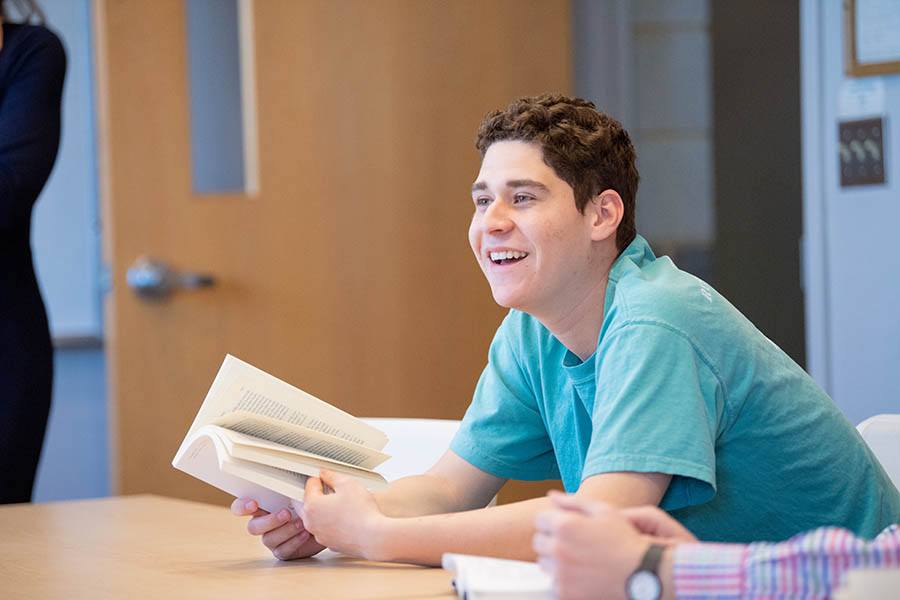Online Learning 101: Everything You Need to Know Before You Enroll

Credit: Villanova University / Paul Crane
We’re all trying to make the best of social distancing by looking for productive outlets for our time. For that reason, many people, from teenagers to retirees, are considering online summer classes. After all, if you can knock out professional development, personal enrichment, and expanding your social circle all in one go, that’s a pretty productive summer. Fortunately, Philly is home to one of the leaders in the field in Villanova University, which has taken steps to expand its online course offerings this summer. We spoke with Kristy Irwin, assistant vice provost of online programs, about how to find the right online class and get the most out of it once you’re enrolled, whether you’re a current college student looking to get a jump on the next semester, a high school student looking to take your education to the next level, or an experienced professional looking to advance your career with a new credential or certificate.
What to Expect from Online Learning
Well-designed online courses are not just options to turn to in summer or in a crisis situation out of necessity. Increasingly, online educational modules are part of the learning experience, and allow faculty to approach instruction in innovative ways. According to Irwin, the best online classes are designed well in advance of their launch in a structured development process centered on the learning objectives.
“We have people skilled in learning science and technology, who partner with faculty members to translate their syllabus to an online course,” Irwin says. “The goal is to create a certain level of engagement with students.” Through advances in online platforms, online courses can replicate the balance of engaging live discussion and solo work that characterizes successful in-person classes. Online courses may be comprised of both pre-recorded lectures and live video meetings, followed by discussion posts and opportunities to react to those posts. They may also allow students to provide live and pre-recorded feedback on each other’s work, and professors to host one-on-one meetings with students, all through a single learning management system. The result is as intuitive and rich an experience as a lively classroom, minus the chalk.
Dr. Valentina DeNardis, director of classical studies at Villanova and alumna of the Institute for Emerging Leadership in Online Learning, notes “The technology that is available today, such as a tool like Microsoft OneNote Class Notebook, offers a digital canvas on which I can share texts, images, and real-time digital inking during a live online class session, all of which material is automatically saved online for students to reference.”
It’s not just technology that makes an online class succeed, however. Many of the qualities that make an in-person class great need to be maintained online. “For example, at Villanova, our classes tend to be small,” Irwin says. “That’s an important component because having numerous people in one online course may mean students have less opportunity to interact via discussion boards and other community-based activities.”
Enrollment in a summer course is also an easier process than you might think. “It’s a very simple online application for anyone that is interested,” says Irwin. She also noted that for many students enrolled in another college, receiving transfer credit is usually a simple process—just make sure you have approval from your home institution before taking the course.
The Online Learning Experience
Online learning is still a different experience than in-person learning, and students should be prepared for the change. “Some people believe online courses will be easier, but in reality, while the experience is different, the rigor is the same,” Irwin says. She says students who do best are often very self-motivated, and adopt a firm schedule for themselves to stay on track.
“It’s the same amount of work, so you should make sure you don’t fall behind,” Irwin says. The hard work pays off, however. Even a single course can produce immediate professional benefits, if you look for courses that address in-demand areas of expertise. Villanova’s College of Professional Studies also offers courses in project management, human resources, business analysis and even Lean Six Sigma. You’ll know you’ve made the most of your summer if you’re walking away with a credential or certificate you can point to for the rest of your career.
For Irwin, the benefits go beyond development, to the experiences you have in class—experiences you might not get anywhere but in an online course.
“You cannot hide on a Zoom call; your face is right there with everyone else’s in the class. Some people find that it’s much easier to participate than they would in a traditional classroom,” Irwin says. “Students who have pushed their comfort zone, have not only been successful in online learning, but have created valuable relationships with a diverse group of people they could have only met in an online course.”
“Students who are new to online learning are often surprised at how connected they feel to their online classmates,” DeNardis says. “Whether through synchronous tools like video meetings or asynchronous tools like chats, blogs, and digital collaborative workspaces, students can gain skills in working as a team and get to know each other just as well as in a campus setting.”
If you’d like to learn more about taking an online class this summer, visit villanova.edu.
This is a paid partnership between Villanova University College of Professional Studies and Philadelphia Magazine


